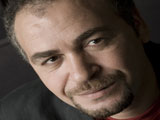I Don’t Feel Any Revolutionary Frustration!
by Hamdy El-Gazzar and translated by Amani Elmawed / December 2, 2013 / No comments
Egyptians have achieved a lot to be proud of since January 2011.

February 1, 2011, protestors rally in Tahrir Square calling for former President Mubarak to step down. Photo by Joseph Hill via Flickr.
A friend of mine, who is a novelist, asked me if, like him and “all people,” I feel any revolutionary frustration. He also asked me to write about how the people in Egypt are feeling, so I answered him by saying:

- “From Egypt” attempts to draw a cultural map of Egypt and the Arab world by profiling the artistic, literary, and political issues that affect the region via on-the-ground coverage of current events, publications, and the fight for freedom of expression.

- Hamdy El-Gazzar is an Egyptian writer and one of the 39 young Arab writers included in the Beirut 39 Project. His first novel, Sihr Aswad (Dar Merit, 2005) won the prestigious Sawaris Award, and was subsequently translated by Humphrey Davies (Black Magic, AUC Press, 2007). His second novel, Ladhdhat Sirriyya (Secret Pleasures) was published by Dar al-Dar in 2008. He is currently working on a third novel.
“I don’t feel any ‘frustration,’ particularly of a revolutionary type, or any frustration related to the great Egyptian revolution that started on January 25, 2011. I insist on describing it as ‘great’ to remind myself and others that it is indeed such, that we have achieved a lot to be proud of, and that the the high price we paid in the blood of martyrs and victims might actually change this country sooner or later.”
There is a beautiful saying: “The flutter of a butterfly’s wings can affect the movement of the deepest ocean.” Yet, what has happened in Egypt since January 2011 was not the flutter of butterfly wings, but an enormous movement, the scream of millions of Egyptians; the outpouring of a youthful, brave, adventurous, and noble voice. This overwhelming voice—our real voice—dims inside of us sometimes. We ignore or forget it as a result of what happens every day, day after day, and we grow to think that we’re not on the original, or real, track; or, conversely, that this might actually be the right track to achieve our goals. Perhaps this “revolutionary frustration” comes from inside those who feel it. I think it comes from one’s emotions and ideas more than it comes out of real-time events. As a result, “the frustrated revolutionary” suffers because of the disconnect between reality and his expectations concerning the track that he believes is the only way forward.
The truth is, we’ve forgotten about how, in 2011, we didn’t use the word “revolution” and how little we really knew about the concept. We might have glanced over it while reading a book, but in reality none of us saw it as an “occurrence” that was forming itself inside ourselves at the same time that it was happening. We must remember that it’s a completely new event that looks like learning how to crawl and walk!
In short, at the time, we didn’t know or realize what it was. The last main change that happened in Egypt was more than sixty years ago—by this I mean the 1952 revolution—and while this coup was described as a “revolution,” the people did not join it.
These days we’ve also forgotten about those who had been protesting and fighting for change since 2004, and how most of those who called for demonstrations on January 25th were exactly like us: They weren’t fully aware of what they were calling for, nor did they expect the results of their actions. The first noble characters that stepped up in the beginning of the revolution were just an intellectual bunch formed by the movement and gathering of the people, which grew to include their dreams and aspirations.
We forget that most of us were surprised by what happened, which changed completely as reality changed.
We forget because we are frustrated and dissatisfied. We get frustrated because the food on the table is not enough to satiate our gluttony, and because our fingers were hurt; we forgot that in conducting surgery on Egypt we cut apart the whole body to reach the brain, heart, and guts at the same time. On top of that, we expected to finish the operation quickly, with minimal pain and great success!
Remembering is good medicine for frustration, but what’s better is keeping what we own and paying attention to it.
I believe that the revolution will continue for years, that it will achieve some of what our martyrs have fought for, that it is one of the greatest popular revolutions in history, and the largest operation undertaken by a nation in our time.
Simply put, this revolution, the great uprising, has returned to Egyptians their lost humanity and dignity; millions shouted for freedom and justice, and I don’t think we’ll go back to the point we were at before January 25th. Those avant-garde millions will present more and give Egyptians a new life, new values, and a new sense of innovation.
I am not frustrated at all. I’m happy because I was there and I’m here now, able to say and write these words.




